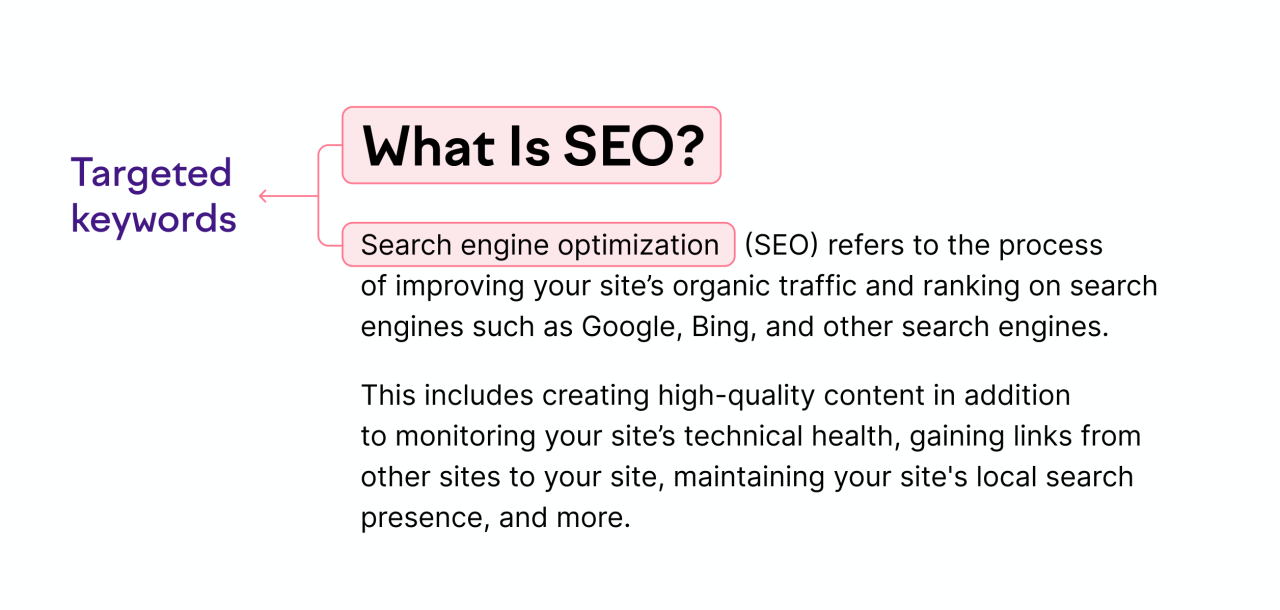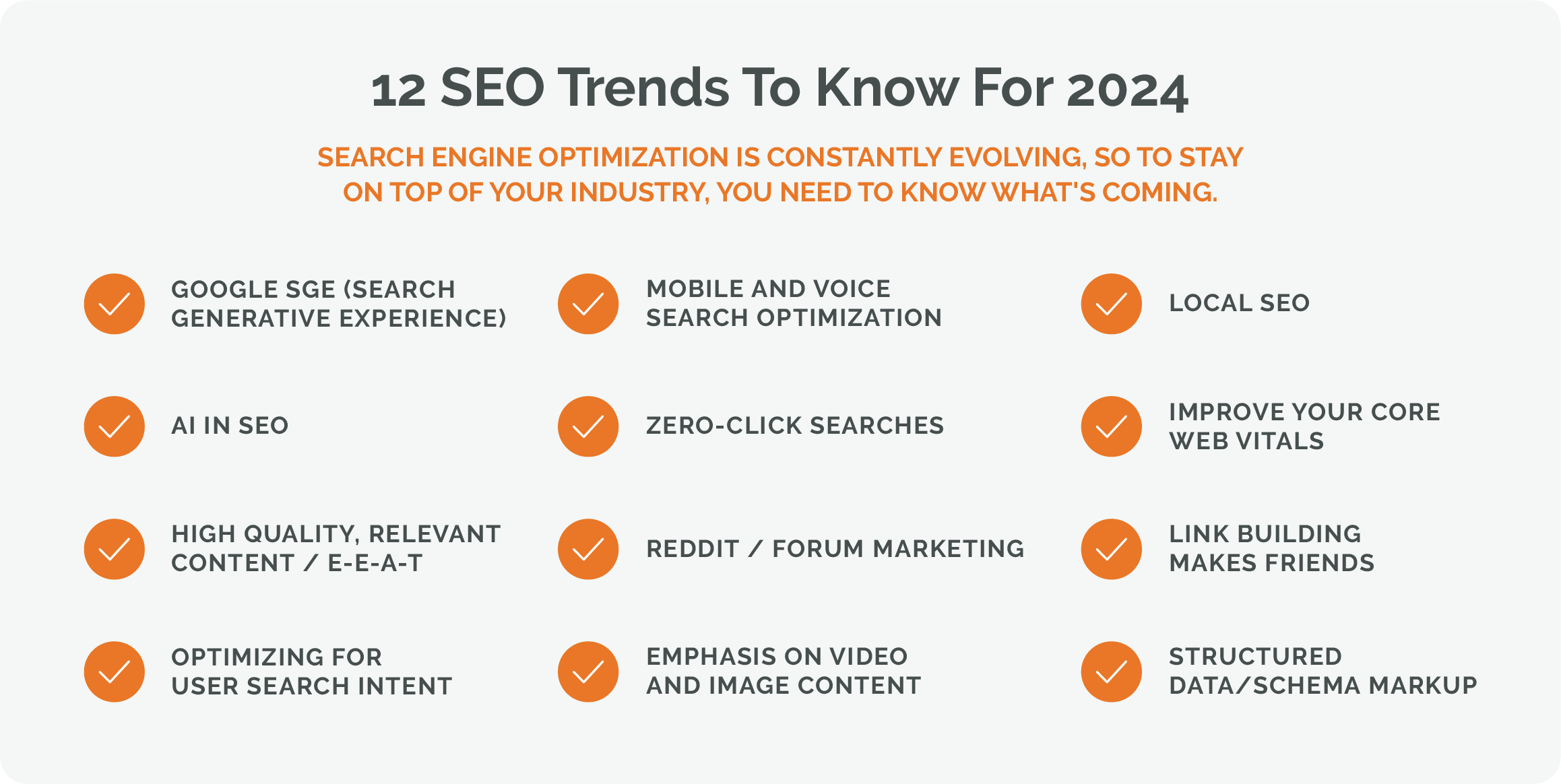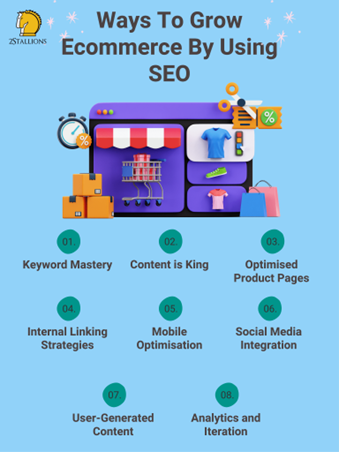Content
SHARE

In the ever-evolving world of online retail, staying on top of the latest SEO trends is crucial for success. As we look ahead to 2025, it’s essential to understand SEO’s role in eCommerce and how it can shape the future of online businesses. In this article, we’ll explore the importance of SEO in eCommerce, predict the SEO trends for 2025, and discuss how to adapt your eCommerce strategy accordingly. Let’s dive in!
 (Source: https://www.linkedin.com/pulse/what-seo-why-so-important-tatev-hackobian/)
(Source: https://www.linkedin.com/pulse/what-seo-why-so-important-tatev-hackobian/)
Understanding the Importance of SEO in eCommerce
The success of any online business relies heavily on its visibility in search engine results. This is where SEO comes into play. Search Engine Optimisation is optimising a website to improve its organic search rankings. By optimising your eCommerce site, you can increase its visibility, drive more traffic, and ultimately boost your sales. SEO is not just about getting your website to the top of the search results. It’s about providing a seamless and user-friendly experience for your customers. When your website is optimised for search engines, it becomes more accessible and easier to navigate, making it more likely for visitors to convert into loyal customers.
The Role of SEO in Online Business Success
SEO is not just a buzzword or a passing trend. It is a fundamental aspect of online business success. Solid SEO is essential to stand out with millions of eCommerce websites vying for attention. By focusing on SEO, you can attract targeted traffic to your site, improve your visibility, and ultimately increase your chances of driving conversions and generating revenue. Moreover, SEO allows you to build trust and credibility with your audience. When your website appears at the top of the search results, it signals to potential customers that your business is trustworthy and authoritative. This can significantly impact their decision-making process, leading to higher conversion rates and brand loyalty.
How SEO Strategies Shape eCommerce Trends
The eCommerce landscape constantly evolves, and SEO strategies are vital in shaping these trends. As search engines become more sophisticated, the SEO techniques that worked in the past may not yield the same results in the future. 2025 we expect several key SEO trends to dominate the eCommerce industry. One of the most significant trends is the rise of voice search. Optimising your eCommerce site for voice search will be crucial with the increasing popularity of voice-enabled devices like smart speakers and virtual assistants. Voice search queries are often conversational and longer, so tailoring your content to match these queries will be essential for ranking well.
Another trend to watch in 2025 is the increasing importance of mobile-first indexing. With more people accessing the internet through mobile devices, search engines prioritise mobile-friendly websites. Ensuring that your eCommerce site is optimised for mobile will improve user experience and enhance your search engine rankings. Furthermore, AI and machine learning will continue to play a significant role in SEO. These technologies can analyse massive amounts of data and predict user behaviour. By leveraging AI and machine learning in your SEO strategy, you can gain valuable insights, personalise user experiences, and stay ahead of the competition.
(Source: https://zerogravitymarketing.com/seo-tips-and-trends/)
Predicted SEO Trends for 2025
The Rise of Voice Search and Its Impact on SEO
As mentioned earlier, voice search is set to become even more prevalent in 2025. With devices like Amazon Echo and Google Home gaining popularity, people are embracing the convenience of voice commands to search for information and purchase online. Like any other SEO trend, the rise of voice search will require careful optimisation. It’s important to understand users’ natural language patterns when using voice search. Tailoring your content to these patterns and implementing schema markup to provide structured data will help your website rank well in voice search results.
The Increasing Importance of Mobile-First Indexing
Mobile-first indexing has been an ongoing trend in recent years, and its significance will only continue to grow in 2025. Google and other search engines now prioritise mobile-friendly websites in their search results, as most online searches are performed on mobile devices. You must prioritise responsive web design to optimise your eCommerce site for mobile-first indexing. A responsive website adapts seamlessly to different screen sizes and provides a consistent user experience across devices. Optimising page load speed and implementing AMP (Accelerated Mobile Pages) can further enhance your mobile SEO.
AI and Machine Learning in SEO
Integrating AI and machine learning into SEO is set to revolutionise how we optimise websites. AI-powered algorithms can analyse user behaviour, search patterns, and other data to provide personalised search results. SEO strategies must focus on providing users with highly relevant, engaging, and personalised content. Implementing AI and machine learning in your SEO efforts can also help you automate repetitive tasks like keyword research and optimisation. By harnessing the power of these technologies, you can free up time and resources to focus on more strategic aspects of your eCommerce business.
 Adapting Your eCommerce Strategy to 2025 SEO Trends
Adapting Your eCommerce Strategy to 2025 SEO Trends
Preparing for the Shift towards Voice Search
As voice search gains momentum, optimising your eCommerce site accordingly is crucial. Start by identifying the natural language queries your target audience will likely use when performing voice searches. Incorporate these long-tail keywords into your content to improve your chances of ranking well in voice search results. Additionally, consider creating FAQ pages that provide concise and informative answers to common questions about your products or services. Voice search often relies on these queries, so having well-structured and relevant content can significantly boost your visibility.
Optimising Your Site for Mobile-First Indexing
With mobile devices becoming the primary means of accessing the internet, it’s essential to prioritise mobile optimisation for your eCommerce site. Ensure your website is responsive and provides a seamless user experience across devices. Focus on improving page load speed, as slow-loading pages can negatively impact your search engine rankings and user experience. Compress images, enable caching, and minimise unnecessary scripts to optimise your site’s performance on mobile devices.
Leveraging AI for Improved SEO Performance
Embracing AI and machine learning in your SEO strategy can give you a competitive edge in 2025. Utilise AI-powered tools to analyse user behaviour, identify trends, and make data-driven decisions. This will enable you to create more targeted and personalised content that resonates with your target audience. Automate your keyword research process using AI algorithms to find low-competition, high-conversion keywords. Additionally, leverage AI-driven content optimisation tools to continuously enhance your website’s SEO performance.
The Future of eCommerce SEO Beyond 2025
Long-term SEO Strategies for eCommerce Success
Looking beyond 2025, long-term SEO strategies will become increasingly important for eCommerce success. Continually monitoring search engine algorithms and adapting your SEO tactics accordingly will be crucial to maintaining your website’s visibility. Additionally, keep a close eye on emerging trends and technologies to stay ahead of the competition. Investing in quality content creation and nurturing relationships with your customers will also play a vital role in the future of eCommerce SEO. Engaging and informative content and a personalised user experience will help establish your brand as a trusted authority in your industry.
The Potential Impact of Emerging Technologies on SEO
The future of SEO in eCommerce is likely to be shaped by emerging technologies such as augmented reality (AR), virtual reality (VR), and blockchain. These technologies can potentially transform how people interact with online stores and make purchasing decisions. As an eCommerce business, staying informed about these emerging technologies and understanding how they can be integrated into your SEO strategy will be crucial for staying competitive in the long run. As we approach 2025, it’s clear that SEO will continue to play a crucial role in the success of eCommerce businesses. By understanding the importance of SEO, predicting and adapting to the upcoming trends, and leveraging emerging technologies, you can stay one step ahead and ensure your eCommerce site thrives in the competitive online landscape.
Frequently Asked Questions About eCommerce SEO
What Is eCommerce SEO, and Why Is It Important?
eCommerce SEO involves optimising your online store to rank higher in search engine results pages (SERPs) for relevant keywords. This is important because higher visibility in search results can lead to more traffic and, potentially, more sales. It involves optimising your website’s structure, content, and technical aspects to meet search engines’ relevance and user experience criteria.
How do I find the Right Keywords For My eCommerce Site?
Start by conducting keyword research to understand what potential customers are searching for related to your products. Use tools like Google Keyword Planner, SEMrush, or Ahrefs to identify high-volume, relevant keywords. Focus on long-tail keywords, which are more specific and less competitive, making it easier to rank for terms that potential customers are likely to use when they are closer to making a purchase decision.
What Are the Best Practices For On-Page SEO on eCommerce Sites?
On-page SEO for eCommerce sites includes optimising title tags, meta descriptions, and headers with relevant keywords. Product descriptions should be detailed, unique, and include keywords. High-quality images with optimised alt text are also important. Additionally, ensure your site has a logical structure (with clear categories and subcategories) to improve user experience and help search engines understand your site.
How Can I Improve My eCommerce Site's Technical SEO?
Technical SEO involves making sure your site is crawlable and indexable. This includes using a responsive design so your site is mobile-friendly, improving site speed, implementing SSL for security, creating an XML sitemap, and ensuring no broken links or duplicate content issues. Also, utilise structured data (schema markup) to provide search engines detailed information about your products and services.
How Do I Measure the Success of My eCommerce SEO Efforts?
Measure your SEO success by tracking key metrics such as organic traffic, conversion rate from organic search, average order value from organic traffic, and rankings for your target keywords. Tools like Google Analytics and Google Search Console can provide insights into how users find and interact with your site. Regularly reviewing these metrics will help you understand the effectiveness of your SEO strategies and where adjustments may be needed.


 Adapting Your eCommerce Strategy to 2025 SEO Trends
Adapting Your eCommerce Strategy to 2025 SEO Trends










